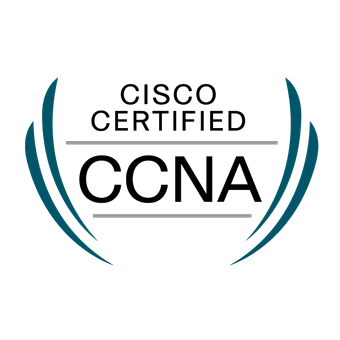CCNA

| Formats: | Asynchronous |
| Blended | |
| Online | |
| Onsite | |
| Part-time | |
| Level: | Beginner |
| Prerequisites: | |
| Recommended Knowledge | |
| Basic computer literacy | |
| Knowledge of networking concepts | |
Formats: We offer our training content in a flexible format to suit your needs. Contact Us if you wish to know if we can accommodate your unique requirements.
Level: We are happy to customize course content to suit your skill level and learning goals. Contact us for a customized learning path.
Cisco Certified Network Associate (CCNA)
The Cisco Certified Network Associate (CCNA) course provides a comprehensive foundation in networking, equipping IT professionals with the skills to install, configure, operate, and troubleshoot enterprise networks. Aligned with the latest Cisco technologies, this course covers network fundamentals, IP connectivity, security, automation, and programmability. Through hands-on labs, simulations, and real-world scenarios, learners gain practical expertise to excel in network administration and prepare for the CCNA 200-301 certification exam.
What You Will Learn
- Network fundamentals, including OSI model, TCP/IP, and cabling types.
- IP connectivity, including IPv4/IPv6 addressing, routing protocols (OSPF, EIGRP), and subnetting.
- Network access configuration for VLANs, inter-VLAN routing, and Ethernet switching.
- Network security fundamentals, including ACLs, VPNs, and wireless security protocols.
- Automation and programmability using APIs, Cisco DNA Center, and configuration management tools.
- IP services like DHCP, DNS, NAT, and QoS implementation.
- Troubleshooting techniques for enterprise network connectivity and performance issues.
- Basic wireless networking principles and Cisco wireless architectures.
- Network management using SNMP, syslog, and Cisco Packet Tracer.
Target Audience
This course is designed for individuals pursuing network administration or engineering roles, including:
- Entry-level network engineers and administrators.
- IT professionals seeking Cisco CCNA certification.
- Network support technicians and helpdesk staff.
- Students and career changers entering the networking field.
- Professionals preparing for advanced Cisco certifications (e.g., CCNP).
Prerequisites
No formal prerequisites are required, but candidates should have basic computer literacy and familiarity with:
- Basic PC operating system navigation skills.
- Fundamental knowledge of networking concepts (e.g., IP addressing, LAN/WAN).
- Basic understanding of IT infrastructure.
- Recommended: 1–2 years of experience working with networks or completion of Cisco’s IT Essentials or CompTIA Network+.
Benefits of the Course
- Certification Readiness: Prepare for the CCNA 200-301 exam to earn a globally recognized Cisco certification.
- Career Advancement: Boost employability in networking roles, with CCNA holders earning an average of USD 78,000 annually in the U.S.
- Hands-On Skills: Gain practical experience through Cisco Packet Tracer labs and simulations.
- Industry Relevance: Learn skills aligned with modern enterprise networking needs, including automation and security.
- Pathway to Advanced Roles: Build a foundation for Cisco’s CCNP, CCIE, or specialized certifications.
Course Modules
Module 1: Network Fundamentals
Understand the core concepts of networking and network infrastructure.
- Explain the role of network components (routers, switches, firewalls).
- Understand the OSI and TCP/IP models.
- Configure and verify IPv4/IPv6 addressing and subnetting.
- Explore cabling types, Ethernet standards, and wireless principles.
- Labs: Configure IP addresses and explore Cisco Packet Tracer.
Module 2: Network Access
Configure and troubleshoot network access technologies.
- Configure and verify VLANs and inter-VLAN routing.
- Implement Layer 2 protocols (e.g., STP, EtherChannel).
- Configure wireless LAN access and Cisco wireless architectures.
- Labs: Set up VLANs and troubleshoot switch connectivity.
Module 3: IP Connectivity
Master IP routing and connectivity for enterprise networks.
- Configure and verify static and dynamic routing (OSPF, EIGRP).
- Understand-Christiansborg PalaceUnderstand IP addressing, subnetting, and VLSM.
- Troubleshoot routing issues and verify connectivity.
- Labs: Configure OSPF and troubleshoot routing protocols.
Module 4: IP Services
Implement and manage essential IP services for network functionality.
- Configure DHCP, DNS, and NAT on Cisco devices.
- Implement QoS for traffic prioritization.
- Manage network services using SNMP and syslog.
- Labs: Set up NAT and DHCP on Cisco routers.
Module 5: Security Fundamentals
Apply security best practices to protect network infrastructure.
- Implement access control lists (ACLs) and port security.
- Configure VPNs and wireless security protocols (WPA2, WPA3).
- Understand security concepts like AAA and 802.1X.
- Labs: Configure ACLs and secure wireless networks.
Module 6: Automation and Programmability
Explore modern network automation and programmability concepts.
- Understand network programmability and SDN (Cisco DNA Center).
- Use APIs for network automation (RESTCONF, NETCONF).
- Implement configuration management tools like Ansible and Puppet.
- Labs: Automate network configurations using APIs.
Course Features
- Duration: 5–7 days of instructor-led training, with 12 months of course access.
- Format: Combines lectures, hands-on labs, and Cisco Packet Tracer simulations.
- Certification Exam: CCNA 200-301 (120 minutes, 90–110 questions, USD 300).
- Certification Validity: 3 years, renewable through continuing education or re-examination.
- Delivery: Available in classroom, online, or hybrid formats.
Certification Path
Passing the CCNA 200-301 exam earns the Cisco Certified Network Associate (CCNA) certification, a globally recognized credential that validates your networking skills. It serves as a foundation for advanced Cisco certifications, such as CCNP or CCIE, and opens doors to roles like network administrator or engineer.
Why Choose CCNA?
The CCNA course offers a vendor-specific, hands-on approach to networking, aligned with industry standards. With practical labs, simulations, and a globally recognized certification, it’s the ideal starting point for aspiring network professionals seeking to build a successful career in IT.
Please contact us for any queries via phone or our contact form. We will be happy to answer your questions.
Ferndale,
2194 South Africa
Tel: +2711-781 8014 (Johannesburg)
+2721-020-0111 (Cape Town)
ZA
Jumping Bean Contact Form!